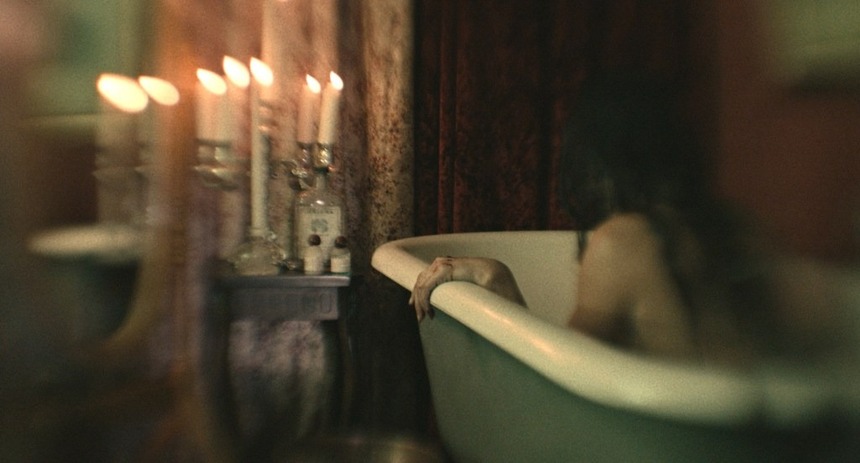THE MISTRESS Review: Middling Psychological Thriller Goes Where Too Many Have Gone Before

A major, possibly key plot element in writer-director Greg Pritikin’s middling psychological/supernatural thriller, The Mistress, turns on whether a newly married, LA-based, 30-something couple, Parker (John Magaro) and Madeline (Chasten Harmon), can get a refund on their down payment and/or terminate their mortgage contract if the sellers didn’t fully disclose whether their new Victorian Era home was, in fact or tradition, “haunted.” It becomes a point of conflict, though not a reason or rationale for staying put long after things begin to go bump in the dark and the evidence begins to pile up that they’re not the only long-term inhabitants of their new home.
The apparent “duty to disclose” (a haunting) also extends to the troubled relationship at the center of the generically named The Mistress. While Parker, a successful non-fiction writer anxiously working on his second book on or about PTSD, and Madeline, a professional costume designer, can somehow afford to buy a sprawling mansion near Echo Park, a variety of signs, symbols, and portents suggest they’re treading on troubled, soon-to-be turbulent water.
She wants children, but he’s hesitant to take the plunge. He has a history of being stalked by an ex, but they don’t talk about it or do anything to safeguard their new home. A new, intrusive neighbor, Dawn (Kat Cunning), oddly prone to under-dressing and over-sharing, suggests an in-film meaning to the title will eventually present itself.
It’s the discovery of a century-old cachet of letters between a mixed-race woman, Rebecca (Aylya Marzolf), and her married Caucasian lover; however, that becomes a point of obsessive interest for Parker and a point of obvious concern for Madeline. A housewarming get-together with friends goes awry while Dawn, ever-present and apparently, ever-eager to keep Parker company in a Biblical sense, keeps coming around.
By then, the friction between Parker and Madeline has grown to a potentially relationship-ending degree, except neither wants to see the truth, let alone do anything to resolve whatever foundational issues they’ve been facing all along.
Almost completely devoid of shocks, scares, or surprises, The Mistress coasts along to a painfully predictable third act, relying almost exclusively on its cast, principally Magaro as the unraveling writer-protagonist, Harmon as the dutiful, if incredibly naive, wife, and the ethereal Marzolf as a self-effacing (possible) apparition, and Cunning as the abrasive, aggressive neighbor. Occasional shots indicate Pritikin and his cinematographer, Antonio Riestra, know their way around a memorable image or two, but if anything should get standout props, it must be Arturo Rodriguez’s remarkably lush, orchestral score.
It’s not exaggerating to suggest that Rodriguez’s old-school score would have easily complemented an erotic or romantic thriller from the last century. Here, it often feels like it’s doing the work — sometimes all the work — in exposing and elevating the tone, mood, and atmosphere of Pritikin’s film. It’s a sign that Rodriguez, like a cast too often left to flounder in underdeveloped, under-motivated characters, deserves a better film for his skills as a composer.
The Mistress opens in limited theatrical release and VOD today (Friday, July 28, 2023), via Blue Fox Entertainment.







